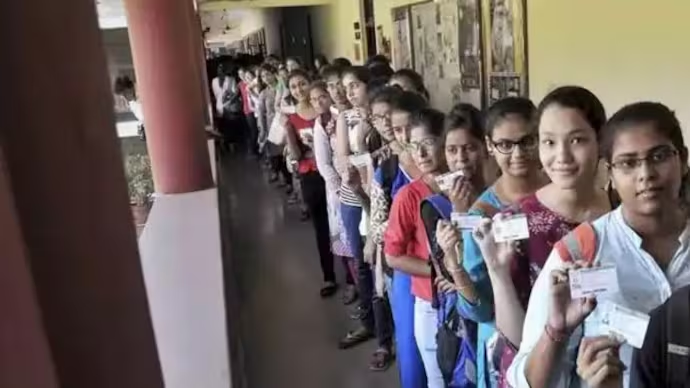
Punchline: With ABVP on course for a sweeping victory in DU, allegations of voting machine tampering by NSUI have ignited a fierce battle over the credibility of campus democracy and the future of student politics.
The Delhi University Students’ Union (DUSU) elections of 2025 have turned into a high-voltage contest, with the Akhil Bharatiya Vidyarthi Parishad (ABVP) appearing poised to sweep all four major posts. Early counting trends, as of September 19, indicated a clear lead for ABVP candidates, triggering celebrations among their supporters across the North and South campuses. This election cycle has once again highlighted how student politics in Delhi University remains a microcosm of larger national debates, reflecting ideological battles between student wings affiliated with major political parties.
ABVP in the Lead
ABVP’s strong performance has been attributed to its extensive grassroots campaign, mobilization in hostels and colleges, and a larger outreach on issues concerning students such as fee hikes, infrastructure gaps, hostel shortages, women’s safety, and job opportunities. ABVP also highlighted national-level issues like the National Education Policy (NEP), scholarships for marginalized students, and better campus facilities. The student body’s dominance in DU politics continues, reinforcing its position as one of the most powerful student organizations nationwide. Analysts suggest that ABVP’s consistent victories in DU are also viewed as morale boosters for its parent body, the Rashtriya Swayamsevak Sangh (RSS), ahead of larger electoral contests.
NSUI’s Allegations
Meanwhile, the National Students’ Union of India (NSUI) has alleged serious irregularities in the polling process. The organization accused ABVP of tampering with Electronic Voting Machines (EVMs). According to NSUI leaders, blue ink markings were found on the ballot buttons corresponding to ABVP candidates in colleges like Hansraj College and Kirori Mal College, a move they claim was intended to influence voters or subtly guide them towards ABVP candidates. NSUI further argued that election authorities failed to maintain transparency in securing voting machines and conducting the polling fairly.
NSUI has demanded an immediate investigation into the allegations, arguing that the credibility of DUSU elections is at stake. Its leaders have also warned of protests and sit-ins across the DU campus if the university administration and election commission do not address these grievances. For NSUI, these allegations are not just about this election but about protecting the larger democratic fabric of student politics.
ABVP’s Response
ABVP has categorically denied the allegations, calling them baseless and politically motivated. According to ABVP leaders, these claims are a “frustrated attempt” by NSUI to delegitimise the mandate of students who have voted overwhelmingly in favor of ABVP candidates. ABVP leaders also pointed out that their campaign was issue-driven and resonated with students because it focused on real problems faced on campus rather than just rhetoric. They accused NSUI of trying to cover up its organizational weaknesses and declining support base among students.
Voter Turnout and Student Sentiment
This year’s DUSU polls witnessed a 39.45% turnout, a noticeable increase from the previous year’s 35%. Many students cited pressing concerns like campus safety, women’s representation, academic reforms, and the need for better placement opportunities as reasons for their participation. The increase in turnout is also seen as a sign of growing student engagement in campus politics, even as debates continue about whether these elections truly serve student needs or mirror national-level political battles.
Women candidates, in particular, have played a stronger role this election cycle, with many student organizations fielding them prominently. This is seen as a positive shift in DU’s student politics, where gender representation has often been criticized as inadequate. Student observers also noted that campaign styles have changed, with a heavier reliance on social media platforms, WhatsApp groups, and Instagram reels to connect with the electorate, supplementing the traditional poster campaigns and loud campus rallies.
The Road Ahead
As counting continues, the stage is set for ABVP to register another significant victory in Delhi University’s political landscape. However, the NSUI’s allegations of EVM tampering cast a shadow over the celebrations, sparking debate about the integrity of student elections. The outcome of this controversy may also shape conversations about the role of technology in elections at both campus and national levels. For many, DU elections are not just about student leaders but about testing the political pulse of India’s youth, who will form a crucial part of the electorate in the years to come.
If ABVP does secure a clean sweep, it could further consolidate its dominance in student politics while posing a challenge for NSUI to reinvent itself and rebuild credibility among DU students. The final results will not only shape DU’s student politics but may also carry symbolic weight in the broader narrative of India’s youth and their political engagement.
FOR MORE BLOGS – beyondthepunchlines.com

 Add to favorites
Add to favorites








